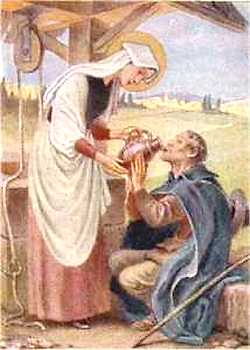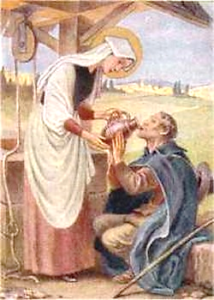
The feast day of St. Anthony of Padua is celebrated on June 13. He is the patron saint of sailors, lost articles and fishermen.
St. Anthony was born in Lisbon, Portugal in 1195. His name at Baptism was Fernando. At the age of 15 Fernando entered the Augustinian Monastery. He did not focus on his studies and prayer, but spent time with friends and enjoyed political discussions. He was sent to Coimbra where he studied for nine years. He was ordained a priest during this time.
A turning point occurred in Fernando’s life after the massacre of five Franciscans. They had been tortured and beheaded. Their bodies were returned from Morocco and carried in a solemn procession to Fernando’s monastery. He was inspired to change orders and become a Franciscan, taking the name Anthony.
St. Anthony was sent to Morocco. but decided to return after becoming ill. He never arrived. His ship was hit by stormy weather and sent off course. He eventually landed on the East coast of Sicily. He was nursed back to health by the friars. While still ill, he attended the great Pentecost Chapter of Mats which was attended by 3000 Friars including St. Francis. Anthony was asked to give a short simple sermon. From then on he became a public preacher. The fire and knowledge with which he spoke inspired many to conversion.
St. Anthony made over 400 trips across Italy and France preaching against heresies. He presented the Christian faith in a positive light. Anthony became the teacher of sacred theology to the friars.

In 1226, St. Anthony was appointed provincial superior at the age of 31. It was in Padua that St. Anthony preached his last and most famous Lenten sermon. The crowds were near 30,000 so he preached in open fields. He was exhausted after the sermon. He knew death was near and received the last rites in the town of Arcilla singing with the friars there.
Shortly before he died he exclaimed,
“I see my Lord!”
He died in 1231 at the age of 36 after serving as a Franciscan for ten years.
St. Anthony is often shown in art holding the child Jesus in his arms. Tradition tells us that one night as Anthony was praying the room was filled with brilliant light. Jesus appeared to St. Anthony as a little child.

St. Anthony was canonized in 1232 by Pope Gregory IX. In 1946 Pope Pius XII declared him a Doctor of the Church.
Poverty is an easy way to God…
Poverty is the mother of humility.
It is as difficult to preserve humility amid riches
as purity in the midst of delights and luxury.
Quote of St. Anthony of Padua
June is the Month of the Sacred Heart.



























